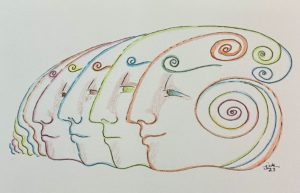
-Artwork © 2023 Jan Ketchel
The question arises: “Who is the You, that never disappoints your Soul?” That you is your personality. And what is the personality?
The personality is a combination of the ego self, which is largely identified with life in the physical body; the subconscious mind, which stores the wisdom of many lives lived; and the High Self, which supports the intention for growth in this life.
The Soul itself is the subtle body that has spawned many lives and many personalities. Each of these has collectively gathered experience and knowledge that contributes to the Soul’s growth. Those prior lives are all connected to the subconscious mind and are reflected, as well, in various ego states and characteristics of the physical body.
The personality’s life in a physical body is the Soul’s investing of its energy in the quest for growth. For growth to happen, the personality must have the free will to set up its own experiments and make its own discoveries in the life it is in, all of which ultimately contribute to the growth of the Soul.
The Soul grows through life experience, not through a personality seeking refuge in simply being good, whereby suppressing into its shadow the fuller spectrum of life’s desires. Although, even such an attempt at a virtuous life is a life of experience that benefits the Soul.
In this case, the Soul discovers that such a one-sided life creates the karmic necessity of another life that can more fully experience the shadow held in abeyance. The Soul does not judge any life to have been a wasted or failed life. All experience is golden and treated with equanimity by the Soul.
Critical judgment issues from the personality. Perhaps its value is to create a restlessness that spurs the personality to stay on point with its core mission in this life.
The ego, however, with its limited knowledge of, and limited connection to, the subtler dimensions of its being, as well as its reason for being in this life, tends to overly judge itself in the context of its achievements and failures in this life. It lacks the richer perspective of its Soul, which appreciates equally all experiences in life.
Growth for the personality requires the maturation of its judging function. The shamans of ancient Mexico were particularly helpful in this respect, in their dictum to suspend judgment. They discovered that self-criticism had the effect of immobilizing one’s vital energy, which is essential to achieve expanded awareness.
It’s not that shamans don’t face the truth of their actions and their consequences; they are in fact ruthlessly insistent upon facing the truth. However, shamans do not define themselves as failures, or as good or bad people. They acknowledge their faults and mistakes and make adjustments in their life to avoid repetition. Or they continue to repeat the same behaviors, accepting the need to finish with a “bad” behavior so that they can then be freed to move on.
Shamans laugh at themselves and are in awe of their blind spots and sheer stupidity. Shamanic wisdom knows that the key to spiritual advancement is complete acceptance of self in every action, thought, and feeling experienced through an entire life. How can we advance to new life if we cannot fully accept ourselves and our entire lives lived?
That acceptance must equally extend to every person who has harmed us in our life. Refusal to accept anything that has happened to us will automatically generate a seed of karma that will attempt acceptance again in another life. Refusal to accept freezes our energy and blocks our advance.
To advance we must free ourselves of any notion of victimhood. Although we may have been victimized, the key is not to freeze ourselves in the self-definition of victim. Acceptance requires full mastery of every fact of our life, however tragic. The Soul does not judge. The Soul values every experience equally. May the personality be guided by this wisdom.
Carl Jung established that there are two ego functions that judge in order to navigate this life: thinking and feeling. Thinking employs the rational mind, and logic, to determine the truth. Feeling uses feelings to actively determine the worth of something. Both of these functions support the ego’s understanding and valuing of life experience.
To exercise these evaluative functions is necessary to navigate life with objectivity. But the emphasis in these functions is to understand and make decisions, not to condemn and define the self with judgments of inferiority, inadequacy, and unworthiness.
The Soul is never disappointed with us. Can we internalize this insinuation from above, and rise to the level of never being disappointed in ourselves and others? This erases no facts or responsibility but does advance us fully in love, through total acceptance of everything.
From a path of heart,
Chuck
